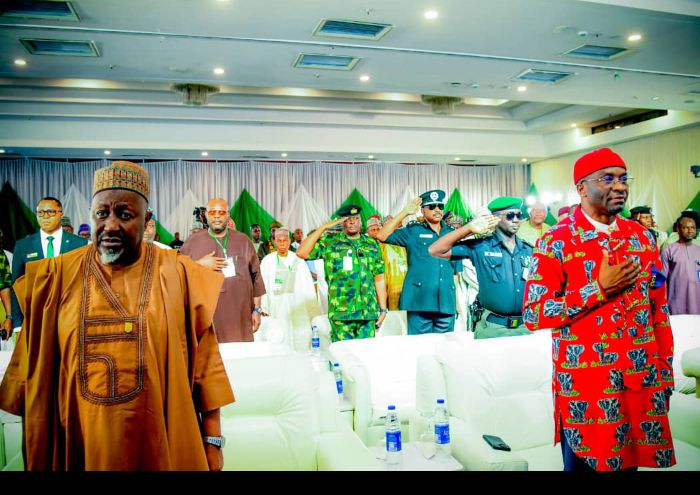News
Support Tinubu to Grant Full Autonomy to LGAs -Speaker Abbas

…Gaps in service delivery wide, people suffering in rural communities -Kalu
By Linda Ike
Speaker of the House of Representatives,.Tajudeen Abbas has urged the State Governors to prioritize the development of Nigeria and support President Bola Tinubu in his quest to grant full autonomy to the local government areas across the country.
This is as his deputy, Benjamin Kalu said that there are wide gaps in service delivery, and the people in the rural communities suffering due to the apparent failure of the local government system to meet up with their constitutional mandate.
The leaders expressed their views at the National Discourse on Nigeria’s Security
Challenges and Good Governance at the Local Government Level organized by the Parliament in Abuja on Monday.
Abbas who was represented by the Deputy Speaker at the event recalled that the federal government recently filed a legal action against the usurpation of local government functions by the sub-national governments.
He said the action showed Tinubu’s determination to correct the anomalies in the system to encourage speedy development at the local government level, stressing that the House has also made frantic efforts through various legislative interventions to arrest the situation.
The Speaker who decried the challenges of the third tier of government however said the House is committed to making the local government administration function optimally according to their mandate.
He said: “The failure of local government is well known to us. Despite the extensive provisions of the 1999 Constitution regarding the existence and functions of local governments, that tier of government has failed to live up to its billing. Some of the most significant challenges impeding their ability to fulfill their constitutionally assigned roles include the covert usurpation of local government functions by state governments, lack of financial autonomy due to the State Joint Local Government Account, political instability from tenure irregularities, and pervasive corruption.
“A critical component of the President’s Renewed Hope Agenda is the integration of local governments into the mainstream of governance in Nigeria. In a significant move, the Federal Government recently instituted legal action against the governors of the 36 states at the Supreme Court, addressing alleged misconduct in the administration of Local Government Areas (LGAs). This action underscores the President’s profound commitment to this issue, one he is intimately familiar with from his tenure as Governor of Lagos State.
“We in the 10th National Assembly are determined and committed to ensuring local governments are recognized and sufficiently empowered to perform their constitutionally assigned roles. As contained in our Legislative Agenda, the House will continue to play a crucial role in advocating for and enacting the necessary legislative frameworks to ensure that local governments are granted the autonomy they rightfully deserve. This is not just a legislative duty but a commitment to the democratic aspirations of the Nigerian people and the Constitution. For this reason, I call on all Governors to put Nigeria first and collectively support the President in the quest to grant full autonomy to local governments.
“We must definitively resolve the controversy surrounding the status of Local Governments by providing the framework needed to ensure their optimal operation.
“Let me reassure you that the outcomes of this national dialogue will receive the full attention of the House and its Committee on Constitutional Amendment.”
In his speech delivered by the House Leader, Professor Julius Ihonvbere at the event, the Deputy Speaker regretted that nonstate actors are taking advantage of ungoverned spaces in the local government areas to make life unbearable for people in rural communities.
“History often takes unexpected turns. Like a once-mighty warrior whose shield has grown rusty, our local governance system has faltered. The gaps in service delivery are wide, and the very people who need them most – our rural citizens – are suffering. This, in turn, has fueled social unrest and violence, creating fertile ground for those who seek to exploit instability.
“As many political analysts and development experts have noted, the near absence or complete breakdown of governance at the local level has
created ungoverned spaces. These spaces have been exploited by non-state actors, making life increasingly unbearable for our rural populace. This is a stark reminder of the urgent need for reform and revitalization at the grassroots level.
“Efforts to address these issues through constitutional amendments by the
7th, 8th, and 9th National Assembly were not successful. Various reasons
have been cited for these failures, but what remains clear is that the
the situation has continued to deteriorate without effective alternative
measures being put in place”, Kalu said.
The Deputy Speaker also promised that the positive outcomes of the discourse would help strengthen the local government administration.
“Specifically, we aim to discuss the bottlenecks inhibiting effective governance at the local government level, ascertain the extent to which weak governance contributes to insecurity and other developmental challenges, galvanize public action for improved governance and service delivery at the subnational level leveraging ongoing reforms like the debate on state police and the constitution amendment exercise, and build national consensus on the most appropriate strategies for strengthening local government governance.
“We must be bold. We must be innovative. And most importantly, we must be united. Only then can we revitalize local governance and ensure that every Nigerian, no matter where they live, feels the embrace of a caring and responsive government.”
